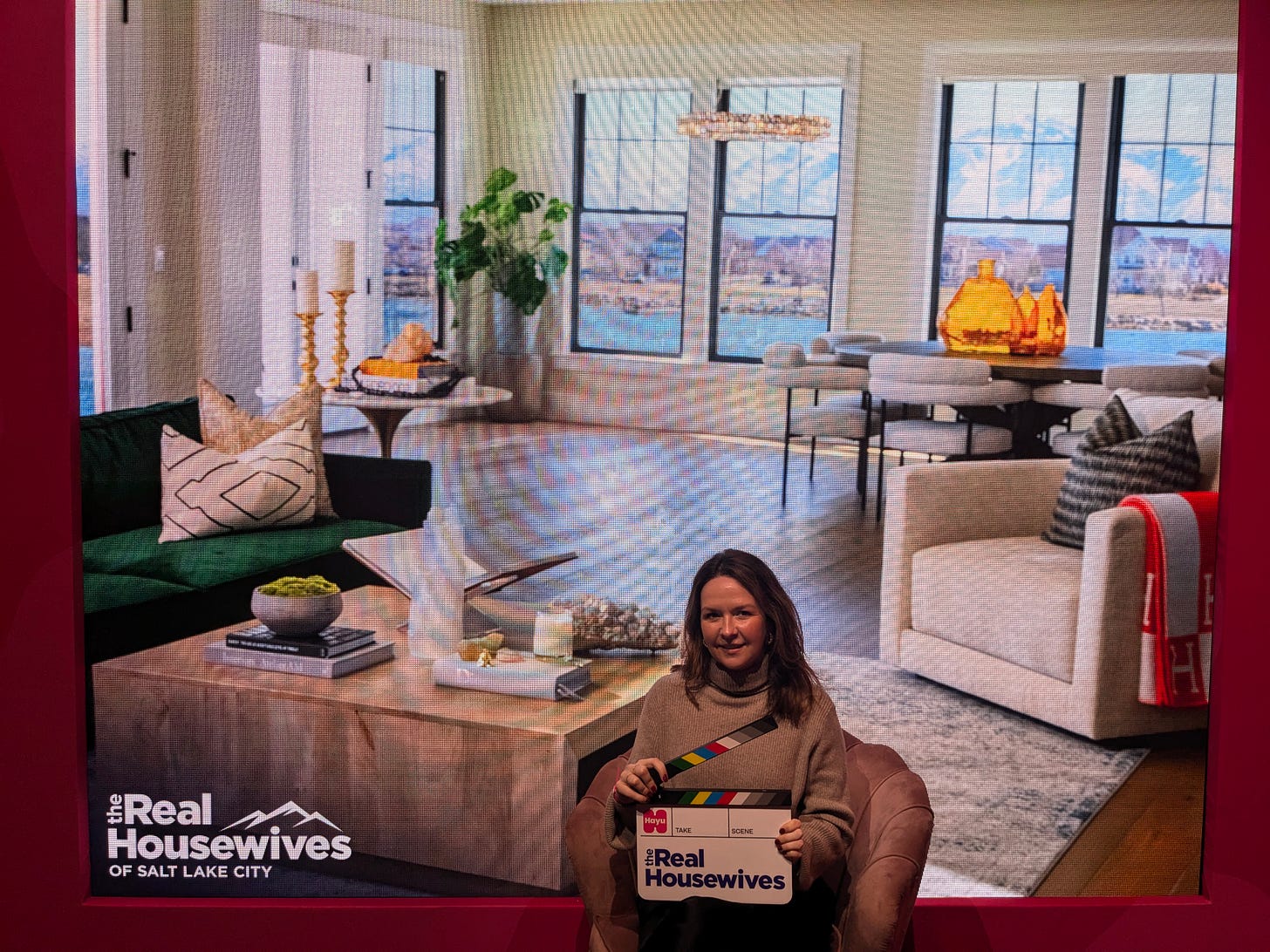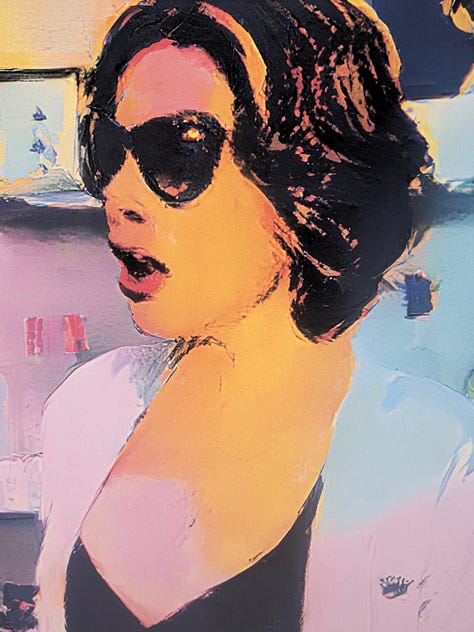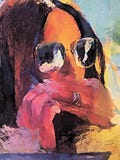A day with the Real Housewives in London
Receipts! Proof! Timelines! And... Greggs. What really happened when the Bravolebrities collected at the very first fan fest in the capital
Hello! I write to you (not so) fresh from Saturday’s Hayu Fanfest, hosted by the TV streamer that is the British home to the phenomenon that is the Real Housewives - as well as many of the spin-offs and sister reality TV franchises also springing from NBCUniversal’s Bravo network.
A Bravo viewer myself - I once told Kyle from Real Housewives of Beverly Hills to that she got me through the pandemic, and wasn’t really being effusive - I scarpered off to a vast venue by the O2 to see what was going on.
So, a fanfest - but was I a fan, really? I wondered, as we walked through the doors. After all, the whole premise of reality TV is relatability (mixed with aspiration, as the designer wardrobes and chiselled cheekbones attest). It’s fun to watch, yes, I thought - lining up for my free themed mocktail to the sound of a jazzy sax - but could I really be a fan of warring Housewives, or say, the badly behaved denizens of Bravo's Southern Charm, the fuckbois extraordinaires of Charleston?
After all, I reflected by the red carpet: we’d just watched SC’s Austen Kroll be greeted by a screaming crowd as he climbed out of a branded taxi cab, the man who in one infamous scene was shown hopping about on screen in his pants and busily denying an alleged threesome interrupted his furious (and now ex-) girlfriend. Could I really be a fan of a - ooh, but look, there was a Real Housewives set to take pictures:

Which pretty much settled that question. At an event like this, you have to go with it, as everyone did - cast included. The Southern Charm boys looked as thrilled to be there as the crowd was to see them (6ft-plus each and possibly the only straight men in an aircraft hangar-sized complex filled with thousands).
That’s the joy of reality stars - no one is busy pretending they don’t want the attention and are desperate to practice their craft in a dark corner somewhere, with preferably no audience at all. They know their fame offers a great platform to launch businesses, careers as influencers, make a ton of money and - maybe best of all - get attention. The Housewives and co are now lucrative brands in their own right with huge followings (Atlanta’s Kandi Burruss leads on Insta with 11 million, by my count) and multimillion-dollar companies that they publicise via their shows (New York’s Bethenny Frankel sold her low-cal-margarita-turned-cocktail business for an estimated $100 million). They’re in the sweet spot of fame - not too much, not too little - that generates just the right amount of freebies and fuss, and they know it. So no wonder these people are here to entertain, and do.
All for the princely sum of £4.99 a ticket. About the same price as a coffee, if you go to the wrong place, and a far cry from the $1,200-VIP ticket prices for the three-day Bravocon event held in Las Vegas. For this London bash: a free themed drink, meal from a food truck, meet and greets, and hours of panels with the stars of the shows. Clearly the pricing was just to discourage people from claiming a ticket without any commitment. This event wasn’t about making money through ticket sales, just as it wasn’t really about the IRL audience - the backdrop as it was all filmed for the host streamer’s online output.
And the TV folk had rolled out all the stops. This was no Wonka-style rip-off. This had its own oil painting and museum section, immortalising favourite moments:



Best of all were the knowing captions:
As well as a props section (when I saw the wall of foliage that I questioned the authenticity of some of these, but surely the Ugly Leather Pants were 100pc real):



Of which none of this will make sense, or is particularly worth explaining if you don’t already watch. Like any other long-running show - and reality TV shows are basically real-life soaps, dethroning their dramatic rivals in the ratings today - they have their own lore and lexicon.
So onto the panels!
We were into our second host to mangle Jessel from RHONY’s name (it’s a challenge for the best of us to keep up with the ever-changing cast line-ups, but must be done), when I realised what felt so novel to me - because who wants to hear from the Bravolebrities on their best behaviour? Unlike traditional celebs, reality stars appear on TV at their least polished and most raw, so hearing them politely praise each others’ franchises and enthuse about their trip to London, was understandably less compelling than what they get up to on screen.
I want Lisa Barlow on the phone dramatically telling her PI to “go the distance on it. THE DISTANCE” after a minor spat with a castmate, rather than gamely praising Greggs onstage. So, gallery toured and panels sampled, it was off into the night, leaving the rest of the crowd behind to cheer to the rafters amid clouds of pink confetti as the newest franchise was unveiled: Real Housewives of London.
If you don’t watch, you might wonder what even is the appeal? It’s trash TV, is the usual cry. Get a real life, you might say (people have).
For anyone somehow yet to discover it, the Bravo network’s universe is built around the Housewives franchise, showcasing the real-life stories of the 30-, 40-, 50- and 60-plus women who star, without ever relegating them to the role of mother-in-law. By this point, the format is honed to perfection: against the backdrop of their luxurious lifestyles, friendships / relationships / bath bomb brands are born and die, and each season ends with a reunion hosted by executive producer Andy Cohen (there in London this weekend), whose Bravo-focused chat show draws in A-listers like Meryl Streep (yes, she watches).
Every series has a distinctly local flavour: New York tends to fast-talking broads; the Beverly Hills cast jostle for status; the Orange Country blondes gather in their McMansions; Atlanta wins the crown for meme-able one-liners; in Salt Lake City, with a huge LDS population, they struggle to reconcile their faith with seismic life events such as divorce; and on it goes. It’s all produced with much more knowingness and humour than non-viewers tend to expect - and adds up to more than the reality TV stereotype.
Some have praised the Housewives for showing all aspects of women’s lives; Elizabeth Day has said it was ‘the first place I saw the reality of IVF shown on television’ while the feminist professor Camille Paglia wrote an essay admitting to watching ‘virtually nothing else on TV’ and comparing Housewives to Dynasty in its Eighties heyday (told you that they’re are displacing soaps on our screens).
After all, where else in pop culture would you find a woman like Luann de Lesseps, 59, who married an Italian count, spent the first few seasons of New York attempting to educate her co-stars on etiquette, only to be humbled by divorce and an arrest in Palm Beach, before embarking on a redemption arc ending with her an unlikely cabaret star coming to a venue near you soon? (Or perhaps not so unlikely: the Housewives are nothing if not camp.)
Increasingly it’s essential to the cultural conversation, as ‘traditional’ celebs get involved. Jennifer Lawrence has proclaimed her Housewives love; Rihanna is an avid viewer and always talking about it on red carpets; Florence Pugh was such a fan that she was Instagram ‘pen pals’ with RHOBH alumna Lisa Rinna for three years before meeting in person at London Fashion Week. The newly rebooted New York series has even seen the arrival of fashion powerhouse Jenna Lyons, the creative force that made J. Crew a must-wear in the Obama years.
It’s all a far cry from when Bravo launched The Real Housewives of Orange Country back in 2006 with a cast of moms in fairly modest suburban homes. The sprawling reality juggernaut has now followed ‘the real housewives of…’ everywhere from Beverly Hills to New York, as well as (as of this weekend) 30 international iterations ranging from Lagos to Cheshire. During its 15-season run, The Real Housewives of Atlanta has pulled in a peak US audience of more than 4.6 million viewers for a single episode; but nowadays global streaming swells the total viewership to millions more around the world.
In tandem, discussion groups, fan pages and more have sprung up around the Housewives – among the most popular, the podcast Everything Iconic with Danny Pellegrino. ‘There’s an entire ecosystem that makes watching feel more like a community than a lot of the other shows on TV,’ Danny, author of the New York Times-bestselling memoir How Do I Un-Remember This? once told me. ‘I love that the franchise showcases women, and oftentimes women over 50. Unfortunately, there aren't a lot of places on TV (or otherwise) where you can see stories centred on older women.” Which all might explain why nearly four in five (78 per cent) of Brits have heard of the Real Housewives of Beverly Hills, according to YouGov stats, despite it being far from traditional primetime TV.
But at the same time - why do we have to defend or justify what’s designed for fun and escapism, any more than you’d have to defend signing up to a Fantasy Football league? Funny that the Bravo shows, which focus on showcasing and appealing to women, can provoke such a reaction... (And enjoy a huge viewership among gay men too, borne out by the weekend’s crowd, a marketer’s dream with everyone dressed for a good time, with lip filler and freshly styled haircuts on show - no shade, but simply to note this crowd had disposable income to spare).
So, a guilty pleasure? There’s no guilt left for me. Life’s too short - or, in the immortal words of Sonja from New York, “you die and catch some dick on the way.” What about you - do you secretly tune in to Beverly Hills or Potomac every so often? And if so… why so secret? Do let me know in the comments.






I had to click on this
Reality TV, since it's inception (for example, 1948 - 2014 Candid Camera) is the exemplar of the private sphere expanding over the public sphere as it recedes via privatization. (example: the public commons of communication is now owned by Elon Musk). Social Media posting, like Instagram was not a horror, but an opportunity we could understand because of reality tv. The Housewives ( I love them! ) are encouraged ( disciplined and let go ) if they do not 'authentically' deliver all their shameful private acts ( divorce, bankruptcies, adultery, surgeries, cancers, social diseases ) grooming us all to be prepared to do the same on social media. I like to think of The Real World ( MTV 1992 ) all the way up to The Bachelor & Love is Blind ( falling in love made public ) model in detail how to expand our private life to include others. What do we retroactively see after we & the Housewives eagerly include others in our private space. See: “It is often said that today, with our total exposure to the media, culture of public confessions and instruments of digital control, private space is disappearing. One should counter this commonplace with the opposite claim: it is the public space proper which is disappearing. The person who displays on the web his naked images or intimate data and obscene dreams is not an exhibitionist: exhibitionists intrude into the public space, while those who post their naked images on the web remain in their private space and are just expanding it to include others” - S. Zizek